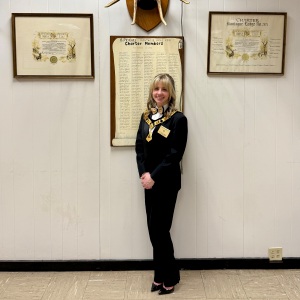Kathe Geist: No place in schools for this Good Book

—
| Published: 08-07-2024 12:04 AM |
I’m gratified to read various views of the Bible on the Recorder’s Opinion page in response to my July 2 My Turn [“A lot to learn from Bible”]. To the reader who doubts I have read the Bible: Yes, I have, cover-to-cover, and I study it daily. Another reader points out some of its darker passages.
Every denomination chooses what in the Bible to believe and how: literally, figuratively, spiritually interpreted and so on. (The idea one often hears from the media that fundamentalists take every word in the Bible literally is nonsense. There are too many contradictions.)
One reader questioned my assertion that the Bible endorses women’s liberation. We don’t see that stated as a particular goal or promise like finding the promised land or healing the sick and reforming the sinner, but for a book written in the patriarchal societies of ancient Greece, Rome, and the Middle East, the deference given to women is astounding.
The Old Testament devotes considerable space to the stories of Sarah, Rachel, Ruth, Hannah, Abigail, Deborah and Esther, as well as to the daughters of Zelophehad, who petition successfully to inherit their father’s land. Jesus is said to be “of the house of David,” but only two characters in that chain of ancestors receive any amount of coverage: David himself and his great grandmother Ruth.
A number of Marys figure prominently in the story of Jesus. One gives birth to him; another is the first to witness his resurrection; another listens intently to his teachings and witnesses the resurrection of her brother Lazarus. Jesus even admonishes that Mary’s sister Martha to stop worrying so much about serving the men of the household and instead come and listen to him. (Normally, only men listened to a rabbi teaching.)
Jesus also has a number of interactions with what could be considered sinful women. He doesn’t condemn them but rather inspires their reformation and devotion. Paul seems more inclined to accept his society’s status quo concerning women, but, he, nevertheless, gives a shout-out to several women, Priscilla and Lydia, for their church-building endeavors.
As patriarchal as practiced Christianity would become, it nevertheless put women in the West far ahead of their counterparts in the non-Christian East in terms of autonomy and respect. One vehicle was chivalry, which developed out of Marian worship. Although feminists in the 1970s rejected chivalry as putting women on a pedestal only to keep them dependent on men, doing so in the Middle Ages was revolutionary. Christians in Meiji-era Japan, for example, whether foreign missionaries or native-born converts, made women’s emancipation a particular goal.
Article continues after...
Yesterday's Most Read Articles
 Local ‘Hands Off!’ standouts planned as part of national effort
Local ‘Hands Off!’ standouts planned as part of national effort
 Shelburne Selectboard determines police detective will retain job
Shelburne Selectboard determines police detective will retain job
 Local libraries react to state funding cuts, federal administrative leave
Local libraries react to state funding cuts, federal administrative leave
 Incandescent Brewing now open in Bernardston
Incandescent Brewing now open in Bernardston
 Cooking up an expansion: Cocina Lupita eyes second location in Turners Falls
Cooking up an expansion: Cocina Lupita eyes second location in Turners Falls
 ‘She is our future’: Thirty years after permitting women to join, Montague Elks is almost entirely women-led
‘She is our future’: Thirty years after permitting women to join, Montague Elks is almost entirely women-led
Notwithstanding its inspiring stories, beautiful poetry, and demanding moral framework, however, the Bible is primarily a book about faith. This is why I read it every day and why mandating its use in public schools, unless in advanced classes devoted to literature or comparative religions, is completely inappropriate.
One letter-writer references the beliefs of Ligonier, a religious organization founded in 1971 to teach “Reformed Theology,” a derivative of Calvinism. Such beliefs should be taught in Sunday School, not public school. Those with a profound Christian faith and worried about the souls of others are free to persuade parents to bring their children to Sunday School.
Proselytizing on the church’s time, not the public’s dime, accords with our Constitution. Forcing a particular faith on public school children does not — and nor does forcing a particular dogma on all women.
Kathe Geist lives in Charlemont.






 As I See It: How liberty itself killed liberalism in America
As I See It: How liberty itself killed liberalism in America My Turn: Invest in hunger-free campuses to make free college truly work
My Turn: Invest in hunger-free campuses to make free college truly work Beth Girshman: Support federal funding of libraries and museums
Beth Girshman: Support federal funding of libraries and museums Dale Moss: Trump, Musk actions will cause long-term damage
Dale Moss: Trump, Musk actions will cause long-term damage
